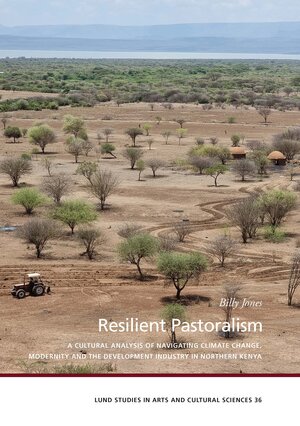Series
Billy Jones
Resilient Pastoralism. A Cultural Analysis of Navigating Climate Change, Modernity and the Development Industry in Northern Kenya
Lund Studies in Arts and Cultural Sciences 36
2025
| 316 p.
|
English
ISSN: 2001-7529
ISBN: 978-91-89874-82-4, 978-91-89874-83-1
Droughts, Floods, Violence and Poverty. The drylands of Northern
Kenya are not an easy place to live. Up here, pastoralism has
been the dominant way of life for centuries. But over the past
half a century, the grass has all but run out, the ecosystem has
fallen apart, and extreme poverty is the norm. And yet, some
people have found a new way to get by. A growing number of
people are switching from traditional forms of pastoralism to
intensively plant grass on private farms. By feeding fodder to their
livestock and harvesting the seeds, they are thriving in the face of
crippling financial pressures and an increasingly erratic climate. At
the same time, millions of dollars of aid money have been poured
into the region via projects to improve livelihoods and rehabilitate
the environment. Very few have succeeded. Only a handful of
locally run projects have managed to make an impact by helping
grass farmers build resilient, environmentally friendly livelihoods.
This thesis tells the story of pastoralism and Development in
Baringo, Northern Kenya. It explores the social, political and
ecological processes which have marginalised the economy and
investigates how pastoralists are adapting their way of life
through grass farming. It also critically examines the International
Development Industry’s attempts to bring sustainable
development to the region, asking how and why so many have
failed. By contrasting these failed attempts with more successful
local initiatives, it hopes to trigger a discussion about how we
might move towards more localised, collaborative approaches to
Development in the world’s most marginalised landscapes.

